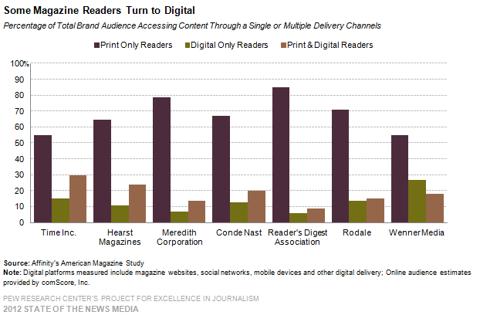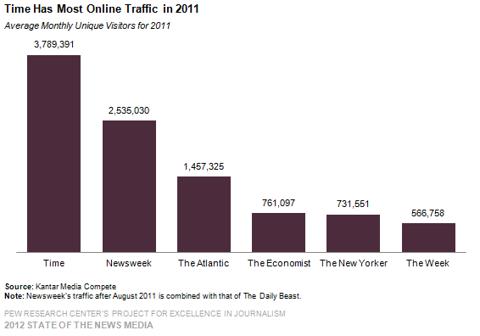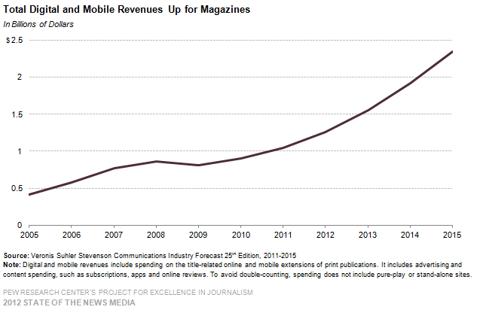But any decision depends on three factors: Time subscribers’ openness to digital content, Time’s online presence and the future prospects of online publishing.
Looking at the graph below, Time has the highest print & digital subscribers percentage, which means people value Time’s content whether it’s in print or online.
In 2011, Time was reported to have the highest online traffic, and I assume it is only going to grow with time. So, that goes to show that Time’s online presence is quite strong in the market.
Are we talking about lower revenues from the digital medium? That should probably be offset by the lower production costs as time goes. The operating income should not be affected much if the whole transition process is being properly managed. In addition to that, revenue from the digital medium should increase over time as consumers incline more and more towards mobile content. So, the future prospects of online publishing are bright.
With the better application of paywalls (whether via one flat fee or multi-subscription options) and higher content delivery fees on mobile devices, the publishing business should slowly turn digital and profitable over time. And that is when the brand names will come into play once again. The more the popularity and authority in the market, the better the revenue options.
Having said that, even a partial divestment of Time, Inc. will hinder Time Warner’s ability to leverage the future prospects of the digital publishing business. If Jeff Bewkes is looking to increase immediate profitability, selling the whole or parts of publishing business might be a good step. But with more instant profits, you forgo your chances of future profitability in the online publishing market. And if part of Time, Inc. is indeed sold in the coming few quarters, it will be highly expected of Time Warner to show how it is going to use the proceeds from sale. That will decide future shareholder expectations from the company and thus, decide the market valuation of the stock.
However, if the publishing business is spun off, it will not be straining on the profits of the parent company. And it will probably be executed under a better management committed to the spun-off company’s success.
Conclusion
When arguably the most popular magazine publications are being owned by Time Warner, it is not wise to sell off, if even in part. We are not talking about sell-off of a publishing business here. We are talking about the sale of a brand name that garners lot of attention and respect in the publishing world. And with every branded product, the packaging matters most. The product sells itself!
The question here is whether Time Warner wants to stay in the publishing business or not. If not, it should sell the whole of Time, Inc. at a high premium. If yes, it should not sell part of Time’s portfolio but rather spin Time Inc. off to create a better company out of it.
The article Why Time Warner Should Think About Spin-Off As Well originally appeared on Fool.com and is written by Suman Chatterjee.
Copyright © 1995 – 2013 The Motley Fool, LLC. All rights reserved. The Motley Fool has a disclosure policy.






